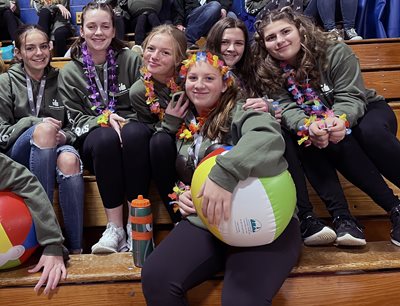Summit encourages students to build their best selves in schools and communities
Date: 03/14/2023

When students come together to network and share ideas about mental health, substance use, and overall wellbeing, schools and communities benefit. That was the spirit behind the Positive Action Team Summit held Friday, March 10 at Piscataquis Community Secondary School (PCSS) in Guilford.
Eighty students from Dexter Regional High School, Penquis Valley High School, PCSS, and SeDoMoCha Middle School were in attendance. Keynote speaker Gordon Smith, Esq., Maine’s Director of Opioid Response, kicked off the day by empowering students to lead the way toward positive change in the fight against opioid use. Students then attended sessions focused on therapy animals and mental health, self-expression, the connection between nutrition and mental health, self-advocacy, and more.
“The first session I went to was pet therapy, then I went to the self-expression session,” says Ava Goulette, a first-year student at PCSS. “It was cool to learn about how animals are used to improve mental health. I think it’s important to come together like this. Everyone here is happy and there’s really good energy.”
The Summit supported the Positive Action Teams’ work in the four participating schools to address some of the biggest challenges that students face every day. Megan Whitten, a senior at Penquis Valley, connected with peers from other schools about vaping, one of the areas of focus for her school’s Positive Action Team.
“It was so nice to see people that I met previously and catch up with them and see how they’re doing,” she says. “We’ve talked about mental health and how our Positive Action Teams have made a change in our communities. It’s really cool.”
The Positive Action Teams are a grant funded collaborative effort between local schools and Northern Light Mayo Hospital. Event organizers hope that students left the day with fresh ideas and the knowledge that there is a whole community standing behind them at their schools, at other area schools, at Mayo Hospital, and even at the state level.
“Throughout the pandemic people have been separated more than ever,” says Bree Clayton, a Community Health Specialist at Mayo Hospital and one of the Summit organizers. “They might not understand that a lot of what they’re going through, their peers are going through. It’s really important for them to get together, make those connections, have those conversations, and hopefully build lifelong bonds to help support their mental health.”